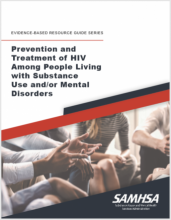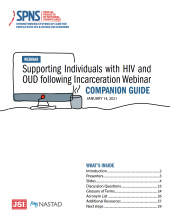
Substance Abuse and Mental Health Services Administration (SAMHSA)



Substance Abuse and Mental Health Services Administration (SAMHSA)
Harm reduction strategies and tools should be accessible to everyone – regardless of location, time, and/or experience.
Articles in this supplement focus on the global opioid crisis, including coverage of harm reduction approaches, health justice promotion, and lessons learned.
This month, the Department of Health and Human Services (HHS), through the Substance Abuse and Mental Health Services Administration (SAMHSA), announced three funding opportunities to strengthen mental health and substance use systems and services for people with or affected by HIV:
Because of naloxone’s ability to reverse opioid overdose and its ease of use, by July 15, 2017, all 50 states and the District of Columbia had passed legislation to improve naloxone access, as one strategy to reduce opioid overdose morbidity and mortality.
This Advisory offers guidance to providers and administrators in SUD treatment programs on screening clients for hepatitis A, hepatitis B, and hepatitis C infections, as well as action steps for the treatment and support of clients with a viral hepatitis infection and a SUD.
This Advisory highlights strategies and considerations for substance use disorder (SUD) treatment providers to integrate HIV services into their practice and effectively engage people with HIV in SUD treatment.
This publication, part of SAMHSA's Evidence Based Resource Guide series, addresses the co-occurrence of HIV and mental illness and/or SUD.
To address the infectious disease consequences of the opioid crisis in the U.S., a public workshop titled Integrating Infectious Disease Considerations with Response to the Opioid Epidemic was convened on March 12 and 13, 2018, by the National Academies of Sciences, Engineering, and Medicine.
This ready-to-use training package is designed to provide HIV clinicians (including physicians, dentists, nurses, therapists and social workers, and counselors, specialists, and case managers) with an overview of the challenges and strategies for change in working with individuals living with HIV